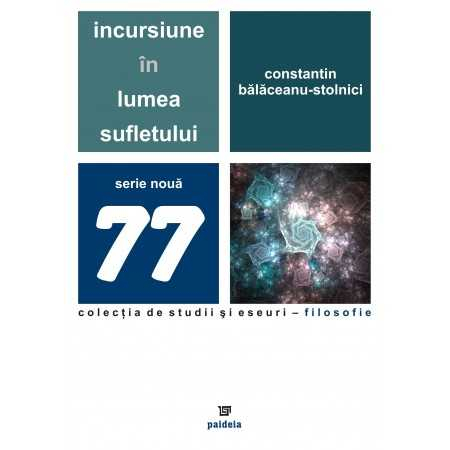Manuscript proposals: [email protected] / 0745 204 115 //// Tracking orders Individuals / Sales: 0745 200 357 / Orders Legal entities: 0721 722 783
ISBN: 978-606-28-1495-3
DOI: https://doi.org/10.5682/9786062814953
Publisher year: 2022
Edition: I
Pages:
Publisher: Editura Universitară
Author: Dragos Balan, Nicusor Tuca
Product Code:
9786062814953
Do you need help?
0745 200 357
- Description
- Download (1)
- Authors
- Content
- More details
- Reviews (0)
The people of Heaven - Adam and Eve - had the original state without sin and with almost complete freedom, like God's complete and natural freedom, only with the requirement to fulfill His will.
After he said "well all", we learn that "God rested on the 7th day" (Genesis 20, 11), in the time of the Holy Apostle Paul, referring to man's rest in "God's rest", i.e. man's peace in communion with God, he asks man to "enter God's rest" (Hebrews, chapter 4).
The apostle reasons that the man who, no longer free - in the sense that he is no longer in the correct freedom, that of good and of the relationship with the Creator - commits many sins, many unnatural deeds, accepts and even fulfills much evil and then he can no longer be in " God's rest" nor will he "enter God's rest" neither here nor in eternity.
After he said "well all", we learn that "God rested on the 7th day" (Genesis 20, 11), in the time of the Holy Apostle Paul, referring to man's rest in "God's rest", i.e. man's peace in communion with God, he asks man to "enter God's rest" (Hebrews, chapter 4).
The apostle reasons that the man who, no longer free - in the sense that he is no longer in the correct freedom, that of good and of the relationship with the Creator - commits many sins, many unnatural deeds, accepts and even fulfills much evil and then he can no longer be in " God's rest" nor will he "enter God's rest" neither here nor in eternity.
-
Reflections on evangelical texts. Essays, sermons and meditations
Download
Pr. DRAGOS BALAN
Pr. NICUSOR TUCA
Pr. NICUSOR TUCA
I. ESSAYS
1. Thoughts at the beginning of the year / 9
2. A fight of all against...all / 14
3. Any battle is won with faith / 19
4. Hells of pain.../ 22
5. Do not ask for anything in place of parental love / 25
6. Intolerance and its consequences / 28
7. Suffering, the path to perfection or an occasion for depression and despair / 32
8. People can be deceived, not God / 36
9. "To live before you die" / 40
10. Everything is a perpetual summons from God in the relationship with people / 47
II. SERMONS
11. The heavens split and the veil of sin is broken (Baptism of the Lord) / 57
12. The Saint of the Preparations (Council of the Holy Prophet John the Baptist – January 7) / 69
13. Christian love, expression of the multiplication of gifts received (Parable of the talents - 16th Sunday after Pentecost) / 78
14. "Serve one another through love" (Parable of the Good Samaritan - 25th Sunday after Pentecost / 88
15. "And tears flow through gold" (Parable of the rich man whose field bore fruit - 26th Sunday after Pentecost) / 98
16. To know how to ask means to know how to give (5th Sunday of Easter Lent - of the Holy Pious Mary of Egypt) / 113
17. The fragrant women - "apostles of the Apostles" (3rd Sunday after Easter - of the fragrant women) / 126
18. The Cross of the Lord and the crosses of men (Sunday after the Exaltation of the Holy Cross) / 137
19. "This disease is not for death, but for the glory of God" (6th Sunday after Easter - of the healing of the blind from birth) / 145
20. Saints are the earth's answer to God's love (1st Sunday after Pentecost - of All Saints) / 162
III. PRIVATE LESSONS
21. The spiritual significance of the Passion and Resurrection of Christ the Savior in human life / 179
1) Period of the Triod / 179
2) The significance of the position / 185
3) The Lord's Entry into Jerusalem / 189
4) The icon of the resurrection of Lazarus in Dostoevsky's office and in our lives / 197
5) The Passion of the Savior / 200
6) The resurrection of Christ from the dead is hope / 205
1. Thoughts at the beginning of the year / 9
2. A fight of all against...all / 14
3. Any battle is won with faith / 19
4. Hells of pain.../ 22
5. Do not ask for anything in place of parental love / 25
6. Intolerance and its consequences / 28
7. Suffering, the path to perfection or an occasion for depression and despair / 32
8. People can be deceived, not God / 36
9. "To live before you die" / 40
10. Everything is a perpetual summons from God in the relationship with people / 47
II. SERMONS
11. The heavens split and the veil of sin is broken (Baptism of the Lord) / 57
12. The Saint of the Preparations (Council of the Holy Prophet John the Baptist – January 7) / 69
13. Christian love, expression of the multiplication of gifts received (Parable of the talents - 16th Sunday after Pentecost) / 78
14. "Serve one another through love" (Parable of the Good Samaritan - 25th Sunday after Pentecost / 88
15. "And tears flow through gold" (Parable of the rich man whose field bore fruit - 26th Sunday after Pentecost) / 98
16. To know how to ask means to know how to give (5th Sunday of Easter Lent - of the Holy Pious Mary of Egypt) / 113
17. The fragrant women - "apostles of the Apostles" (3rd Sunday after Easter - of the fragrant women) / 126
18. The Cross of the Lord and the crosses of men (Sunday after the Exaltation of the Holy Cross) / 137
19. "This disease is not for death, but for the glory of God" (6th Sunday after Easter - of the healing of the blind from birth) / 145
20. Saints are the earth's answer to God's love (1st Sunday after Pentecost - of All Saints) / 162
III. PRIVATE LESSONS
21. The spiritual significance of the Passion and Resurrection of Christ the Savior in human life / 179
1) Period of the Triod / 179
2) The significance of the position / 185
3) The Lord's Entry into Jerusalem / 189
4) The icon of the resurrection of Lazarus in Dostoevsky's office and in our lives / 197
5) The Passion of the Savior / 200
6) The resurrection of Christ from the dead is hope / 205
When the year is renewed, we happily say warm and optimistic wishes, but, in most cases, the years pass, but we do not change. We find the same atmosphere in the houses where the husbands live as two strangers, because they still remain strangers, while in the houses where the husbands love each other, they continue to love each other, because the words of Lorenzo Marone are always current: "if they throw me earth ten more times, I would always cross the same road and continuously bump into the same walls. Most of us are like ants, we climb an already marked path".
Therefore, the big question is: how can we renew ourselves with the years? Because the years are renewed, but if we are not attentive to the renewal of our life, nothing will happen; all the years will pass and we will remain the same, as many years ago. Having no desire for the joy of our life, not realizing that we need to change our way of living, of being, we will conclude like one of Vladimir Nabokov's characters: "Sleptov narrowed his eyes and for a moment he had the impression that his earthly life was as good as it could be clear, naked and comprehensible - sad to the point of horror, humiliatingly meaningless, vain, without miracles...".
We can renew ourselves by repenting, because the great poet Robert Frost characterizes repentance as "the revolution of a man" - a revolution not against the world or other people, but against the evil in us. With this cry of repentance, the church also begins the new year, because on the first Sunday of the new calendar year, which is also the Sunday before the Baptism of the Lord, we receive the exhortation of Saint John the Baptist: "Repent, for the kingdom of heaven is at hand!" (Matthew 3, 2).
However, when we issue the exhortation to repent, we put too few practical methods to accomplish this; we are urged to pray, to fast, but we do not know how to repent. I think that this is the great success of meditation practices from other cultures, that of having specific recommended practices that tell you very clearly what you have to do.
In our case, the method we thought of to change, to renew, to repent starts from what we say in one of the prayers we say at the moment we share: "forgive me , Lord, the mistakes I have committed with the word, with the deed or with the thought". True repentance consists in "working in these three areas". Repenting implies feeling bad and being able to forgive ourselves because we don't know how to forgive ourselves and I say this because when we make mistakes we keep putting the burden of our sin behind us, we accuse ourselves, we blame ourselves, as if we didn't have we are never allowed to make mistakes and have the opportunity to admit that we were wrong. The moment we get to do this, we get to forgive and repent. This does not mean that we must make mistakes on purpose, but when we make mistakes that we do not realize at the moment, we should assume them and correct them. I recently had a conversation with a young woman who told me that she was so "nursed" when she was a child to go to church that when she grew up and had the opportunity to choose, she did the exact opposite in this regard . That is why we need great attention to understand the soul of the one next to us.
Therefore, the first exercise that Orthodoxy proposes to us in a practical way to renew ourselves is that of renewing our speech. Let us have a repentance of the word, in the sense that we must be careful about all the words we say. It is an exercise that must be done at home, because as we speak to others - husband, wife, child, mother, aunt - that is how we speak in society. Most of the time, for example, when we ask for something, we say it commandingly: "give me this!". If we asked for the same thing, but in a different way, we would show the desire to have the joy of dialogue in relation to the one next to us: "my dear, could you give me this too?". Most of the time, when we make a mistake, we don't apologize because we have the impression that the apology serves the one who receives it more to strengthen his opinions than to put a stone on top.
However, an example of the spiritual repentance of the word is that of not judging others; we judge everyone around us, without thinking that we are wrong, that we are hurting: we judge our blood brother, our daughter-in-law, our son-in-law, the priest, our boss.
Only after we correct this mold placed on our mind, on our face even, we can work on the next level, on our thoughts. Therefore, a repentance of thought is necessary. When we are in the church at the service, where are our thoughts? Are we thinking about the glory of God or an immediate concern of ours or the clothing of the one next to us? Do we think about what great gifts we receive in the church? And this is because we gather in the church to exchange gifts with God; we take ours, mortal and powerless, and God gives us the immortal ones. Nicolae Steinhardt says suggestively in this regard: "God is a great nobleman; He does not give as we give, sparingly".
Sincere and clean repentance therefore means to discover inside you those places where you need to clean, as we take care of our houses, our clothes, etc. Years are renewed in vain, if people are not renewed. If we are attentive, in fact, this is the message that runs like a red thread throughout the Holy Scripture: the renewal of man, the new creature who must understand that no matter how low he is, no matter how dark he is, he can rise and maybe give joy and thus can reach peace. To give joy and goodness is, in fact, the repentance of the deed, the third stage, the third exercise that it is natural to carry out in order to renew ourselves, to be able to reconcile with ourselves. The moment you make peace with yourself, you have made peace with the whole universe and thus God and people (heaven and earth) make peace with you.
Thus, we realize that by fulfilling these stages of repentance: of word, thought and deed, we show constant attention to our manifestations in the relationship with God and with people. That's why Olivier Clement says: "Repentance is the attention of our whole being to the joy of His love"; and paying sufficient attention to these manifestations of ours means paying attention to the Resurrection, which by receiving the Sacrament of Holy Baptism has become ours.
When we fulfill the listed ones, making them a spiritual program for the new year, we will also feel a "sweetness and joy", which represents a new way of life, otherwise "you spend your life believing that one day what you hope will happen, only to realize that reality is a little more romantic than you think. It's true, sometimes dreams show up at your door, but only if you were careful to invite them. Otherwise, you can be sure that you will spend the evening alone".
Therefore, the big question is: how can we renew ourselves with the years? Because the years are renewed, but if we are not attentive to the renewal of our life, nothing will happen; all the years will pass and we will remain the same, as many years ago. Having no desire for the joy of our life, not realizing that we need to change our way of living, of being, we will conclude like one of Vladimir Nabokov's characters: "Sleptov narrowed his eyes and for a moment he had the impression that his earthly life was as good as it could be clear, naked and comprehensible - sad to the point of horror, humiliatingly meaningless, vain, without miracles...".
We can renew ourselves by repenting, because the great poet Robert Frost characterizes repentance as "the revolution of a man" - a revolution not against the world or other people, but against the evil in us. With this cry of repentance, the church also begins the new year, because on the first Sunday of the new calendar year, which is also the Sunday before the Baptism of the Lord, we receive the exhortation of Saint John the Baptist: "Repent, for the kingdom of heaven is at hand!" (Matthew 3, 2).
However, when we issue the exhortation to repent, we put too few practical methods to accomplish this; we are urged to pray, to fast, but we do not know how to repent. I think that this is the great success of meditation practices from other cultures, that of having specific recommended practices that tell you very clearly what you have to do.
In our case, the method we thought of to change, to renew, to repent starts from what we say in one of the prayers we say at the moment we share: "forgive me , Lord, the mistakes I have committed with the word, with the deed or with the thought". True repentance consists in "working in these three areas". Repenting implies feeling bad and being able to forgive ourselves because we don't know how to forgive ourselves and I say this because when we make mistakes we keep putting the burden of our sin behind us, we accuse ourselves, we blame ourselves, as if we didn't have we are never allowed to make mistakes and have the opportunity to admit that we were wrong. The moment we get to do this, we get to forgive and repent. This does not mean that we must make mistakes on purpose, but when we make mistakes that we do not realize at the moment, we should assume them and correct them. I recently had a conversation with a young woman who told me that she was so "nursed" when she was a child to go to church that when she grew up and had the opportunity to choose, she did the exact opposite in this regard . That is why we need great attention to understand the soul of the one next to us.
Therefore, the first exercise that Orthodoxy proposes to us in a practical way to renew ourselves is that of renewing our speech. Let us have a repentance of the word, in the sense that we must be careful about all the words we say. It is an exercise that must be done at home, because as we speak to others - husband, wife, child, mother, aunt - that is how we speak in society. Most of the time, for example, when we ask for something, we say it commandingly: "give me this!". If we asked for the same thing, but in a different way, we would show the desire to have the joy of dialogue in relation to the one next to us: "my dear, could you give me this too?". Most of the time, when we make a mistake, we don't apologize because we have the impression that the apology serves the one who receives it more to strengthen his opinions than to put a stone on top.
However, an example of the spiritual repentance of the word is that of not judging others; we judge everyone around us, without thinking that we are wrong, that we are hurting: we judge our blood brother, our daughter-in-law, our son-in-law, the priest, our boss.
Only after we correct this mold placed on our mind, on our face even, we can work on the next level, on our thoughts. Therefore, a repentance of thought is necessary. When we are in the church at the service, where are our thoughts? Are we thinking about the glory of God or an immediate concern of ours or the clothing of the one next to us? Do we think about what great gifts we receive in the church? And this is because we gather in the church to exchange gifts with God; we take ours, mortal and powerless, and God gives us the immortal ones. Nicolae Steinhardt says suggestively in this regard: "God is a great nobleman; He does not give as we give, sparingly".
Sincere and clean repentance therefore means to discover inside you those places where you need to clean, as we take care of our houses, our clothes, etc. Years are renewed in vain, if people are not renewed. If we are attentive, in fact, this is the message that runs like a red thread throughout the Holy Scripture: the renewal of man, the new creature who must understand that no matter how low he is, no matter how dark he is, he can rise and maybe give joy and thus can reach peace. To give joy and goodness is, in fact, the repentance of the deed, the third stage, the third exercise that it is natural to carry out in order to renew ourselves, to be able to reconcile with ourselves. The moment you make peace with yourself, you have made peace with the whole universe and thus God and people (heaven and earth) make peace with you.
Thus, we realize that by fulfilling these stages of repentance: of word, thought and deed, we show constant attention to our manifestations in the relationship with God and with people. That's why Olivier Clement says: "Repentance is the attention of our whole being to the joy of His love"; and paying sufficient attention to these manifestations of ours means paying attention to the Resurrection, which by receiving the Sacrament of Holy Baptism has become ours.
When we fulfill the listed ones, making them a spiritual program for the new year, we will also feel a "sweetness and joy", which represents a new way of life, otherwise "you spend your life believing that one day what you hope will happen, only to realize that reality is a little more romantic than you think. It's true, sometimes dreams show up at your door, but only if you were careful to invite them. Otherwise, you can be sure that you will spend the evening alone".
If you want to express your opinion about this product you can add a review.
write a review

6359.png)
![Reflections on evangelical texts. Essays, sermons and meditations - Dragos Balan, Nicusor Tuca [1] Reflections on evangelical texts. Essays, sermons and meditations - Dragos Balan, Nicusor Tuca [1]](https://gomagcdn.ro/domains/editurauniversitara.ro/files/product/large/reflectii-asupra-textelor-evanghelice-eseuri-predici-si-meditatii-270074.jpg)














